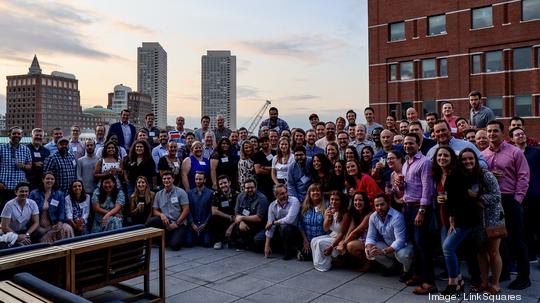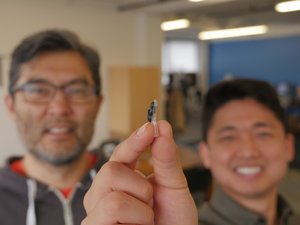
For the past two years, Steve Travaglini’s sales team at LinkSquares was in the office five days a week, every week. Now, as many tech companies are pushing employees to get back into the office, Travaglini and his team have decided to take a step back from their strict policy.
“Now we're, I think, meeting in the middle. There’s a lot of positive things that we learned about remote work across the company, a lot of positive things we learned about in-office work, and it kind of almost seems obvious that the right answer all along was the more moderate one,” Travaglini said.
The LinkSquares sales team is adopting a hybrid schedule with employees working remotely on Mondays and Fridays. It’s a format that some companies have been using for months. After experimenting with fully remote, fully in person and hybrid schedules since the pandemic began, Travaglini said they think they’ve settled on the best option for their team.
But, Travaglini doesn’t regret the time they spent in person over the last two years. The leader spoke to BostInno about the team’s key takeaways from its work-style experiment.
In-person work suits growing teams
Travaglini joined LinkSquares in 2018 when the company had 10 employees. Now, he said they’re at about 430 team members. And heading into the pandemic in 2020, there were around 65 employees. Every department was in the office every day before the pandemic.
There were a few starts and stops for in-person work. The sales and revenue team came back in a hybrid capacity following state and building guidelines toward the end of 2020, Travaglini said. Several Covid-19 variants disrupted that hybrid work schedule a few times, and the team returned fully in person in early 2021.
“The reason we were, I think, so forward leaning, [was that] at the time we were doubling and tripling headcount,” Travaglini said.
As hiring skyrocketed, Travaglini said they began looking at data comparing how long it would take to train a representative to be productive while fully in office, hybrid and remote.
“We just kept seeing when we did things in office, people learned more quickly,” Travaglini said. “Sales specifically is a job where you’re doing a lot of pitch work. You’re learning objection handling techniques. You’re learning about your competitors. You’re learning how to cold call…those skills we saw just accelerate drastically when we had in-office activities.”
Travaglini added that there was also “pressure to be successful with venture capital investment” that came in over the last few years, which helped spur the company's growth. LinkSquares announced a $14.5 million Series A round in 2020 and $40 million a Series B financing in 2021. Then in 2022, the company raised $100 million in Series C funding.
“We found ourselves in this cycle where we were hiring at a rapid pace and all of the data suggested that when you’re hiring at a rapid pace and you’re doubling and tripling headcount, being in office would accelerate the time to production for your sales reps,” Travaglini said.
Different internal policies don’t always work
LinkSquares initially left it up to functional leaders of departments to choose the best work schedule for their employees, Travaglini said. Now, they’re starting to seek a bit more continuity.
“I think as a company, we’re learning it’s really important for different departments and teams to be aligned in schedule — to some degree, not 100%,” Travaglini said.
Travaglini said having teams on different schedules can create “friction culturally” by having teams held to different expectations.
“Having alignment versus pick-and-choose by department is going to be a better recipe for success, because teams will feel like they’re a part of one core company culture and everyone’s being held to the same standards and it’s just more fair,” Travaglini said.
Switching from a hiring to retaining mindset
The strict in-office work policy wasn’t always beneficial, Travaglini said. He believes the company lost some talented people “due to burnout, due to the rigidity and rigor of a five-day, in-person schedule.” He also said his team likely lost out on some potential hires who weren’t interested in a fully in-person job.
“That juice isn’t worth the squeeze,” Travaglini said.
Travaglini said the company does engagement surveys every six months, and in February they started to see feedback about the strict in-person requirements.
LinkSquares is now focusing less on hiring and more on retaining its trained talent, Travaglini said. With that new goal came a reassessment of how to best keep employees at the company.
“I think most people are looking for flexibility and some kind of way of working that better suits their lifestyles, and we want to support that, we want to make sure we’re not losing these amazing people,” Travaglini said.
Sign up for The Beat, BostInno’s free daily innovation newsletter from BostInno reporter Hannah Green. See past examples here.








